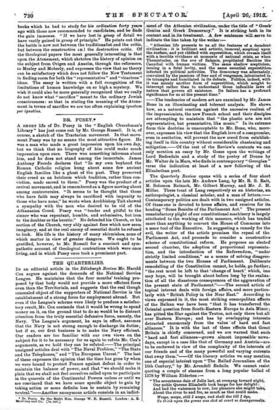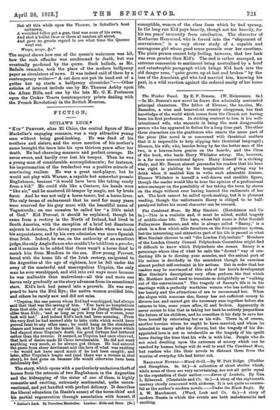T1FIR QUARTERLIE S.
Is an editorial article in the Edinburgh Review Mr. Harold Cox argues against the demands of the National Service League. He maintains that the four months' training pro- posed by that body would not provide a more efficient force even than the Territorials, and suggests that the real though concealed object of the supporters of National Service is the establishment of a strong force for employment abroad. But even if the League's scheme were likely to produce a satisfac- tory result, Mr. Cox contends that it would be wrong to spend money on it, on the ground that to do so would be to distract attention from the truly essential defensive force, namely, the Navy. The League's argument, be says in effect, assumes that the Navy is not strong enough to discharge its duties ; but if so, our first business is to make the Navy efficient. Our readers are too familiar with our own views on the subject for it to be necessary for us again to refute Mr. Cox's arguments, as we hold they can be refuted.—The principal unsigned articles deal with "The Naval Problem," "The State and the Telephones," and "The European Unrest." The last of these expresses the opinion that the time has gone by when we were bound to protect France against defeat in order to maintain the balance of power, and that "we should make it plain that we shall not feel ourselves called upon to participate in the quarrels of the Continental Powers unless or until we are convinced that we have some specific object to gain by taking action or some definite loss to sustain by remaining neutral."—Another anonymous article consists in an indict.
• Dr. Pasty. By the Right Hon. George W. E. RusFell. London: I, B.
ittowlraq Bala (1.e. net.]
ment of the Athenian civilization, under the title of "Greek Genius and Greek Democracy." It is striking both in its content and in its treatment. A few sentences will ,serve to- indicate the line taken by the writer :— , " Athenian life presents to us all the features of a decadent civilization: it is brilliant and artistic, immoral, sceptical upon the surface, and yet riddled with superstition, which reveals itself with a terrible vividness at moments of national crisis, as when Themistocles, on the eve of Salamis, propitiated Bacchus the Cannibal with human victims. The same shallow scepticism, issuing in a fatal levity, and the same essential superstition. infected its political activities. The democracy was alternately, convulsed by the passions of fear and of vengeance, intoxicated in it triumphs and humiliated in its defeats. Politics, indeed, with it was merely another form of superstition, which sought to' interrupt rather than to understand those inflexible laws of nature that govern all existence. Its failure has a profound significance for us at the present time."
The tendencies of modern art are examined by Mr. James Bone in an illuminating and tolerant analysis. He shows bow, as a natural reaction against the excessive realism of the impressionists, the new French school and their disciples. are attempting to maintain that "the plastic arts are not representative, but presentative, like music." In its extreme form this doctrine is unacceptable to Mr. Bone, who, more- over, expresses his view that the English love of a compromise, even in aesthetics, will prevent the new creed from establish- ing itself in this country without considerable chastening and mitigation.—Of the rest of the Review's contents we can only mention an essay by Mr. Gosse upon the writings of Lord Redesdale and a study of the poetry of Donne by Mr. Walter de is Mare, who finds in contemporary " Georgian " verse the indication at least of a new following of the Elizabethan poet.
The Quarterly Review opens with a series of four short
articles upon the late Mr. Andrew Lang, by Mr. R. S. Halt, M. Solomon Reinach, Mr. Gilbert Murray, and Mr. J. H. Millar. These treat of Lang respectively as an historian, an.
anthropologist, a classical scholar, and a man of letters.— Contemporary politics are dealt with in two unsigned articles. Of these one is devoted to home affairs, and receives for its. heading "Some Results of the Parliament Act." The present unsatisfactory plight of our constitutional machinery is largely attributed to the working of this measure, which has tended more than anything to convert the House of Commons into a mere tool of the Executive. In suggesting a remedy for the evil, the writer of the article premises the repeal of the Parliament Act, and proceeds to consider a constructive scheme of constitutional reform. He proposes an elected second chamber, the adoption of proportional representa- tion, and the introduction of the Referendum, "under strictly limited conditions," as a means of solving disagree- ments between the two Houses of Parliament. Deliberate remodelling of the Constitution cannot, he holds, go further; "the rest must be left to that `change of heart' which, One may hope, will be brought about before long by the realiza- tion of all the disastrous consequences of the aggravation of the present state of Parliament."—The second article of topical interest deals with foreign affairs, and more particu- larly with "British Policy in the Near East." According to. views expressed in it, the most striking cosmopolitan effects of the Balkan war have been "that it has transferred the Oriental question from South-Eastern Europe to Asia Minor; has pitted the Slav against the Teuton, not only there but all over Eastern Europe ; and has by overlapping interests.
detracted enormously from the value " of bard and fast alliances." It is with the last of these effects that Great Britain is chiefly concerned, and we are warned that such "hard and fast alliances—grown almost impossible nowa- days, except in a case like that of Germany and Austria—are to be eschewed in view of the complexity of the interests of our friends and of the many powerful and varying currents that sway them."—Of the literary articles we may mention, one of especial intetest upon "The Ballad Journalism of the 16th Century," by Mr. Arundell Esdaile. We cannot resist quoting a couple of stanzas from a long popular ballad of 1578 by William Elderton :— " The seventeene dale of Julie last, at evenyng toward night, Our noble Queene Elizabeth took barge for her delight: And bad the watermen to row, her pleasure she might take, About the river to and fro, as much as thei could make.
Weepe, weepe, still I weeps, and shall doe till I dye,
To think vport the gonne was shot at court so daungerouslie.
But all this while upon the Thames, in Schuller's boat unknown, A wretched folio° got a gun, that was none of his owne, And shot a bullet twoo or three at random all about, And gave no greate regard to see what time the Queene went out.
Weepe, weepe, (tc."
The sequel shows how one of the queen's watermen was hit, how the rash offender was condemned to death, but was eventually pardoned by the queen. Such ballads, as Mr. Esdaile remarks, took the place of the modern halfpenny paper as circulators of news. It was indeed said of them by a contemporary writer—" A cat dare not put its head out of a gutter but up starts a halfpenny chronicler."—Other articles of interest include one by Mr. Thomas Ashby upon the Alban Hills, and one by the late Mr. G. K. Fortescue upon the Croker Tracts (contemporary prints dealing with the French Revolution) in the British Museum,



























































 Previous page
Previous page